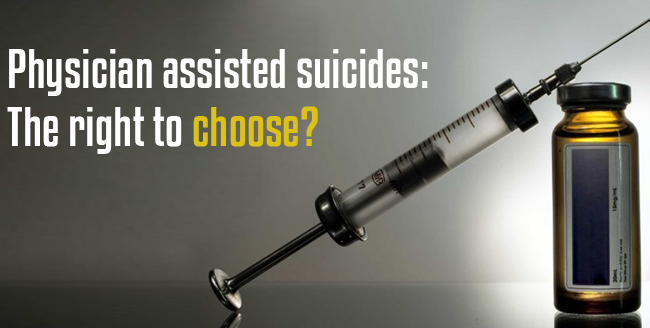- California might become the sixth state to protect aid-in-dying practices.
The End of Life Option Act, a bill that would allow doctor-assisted suicide for some terminally ill patients, was recently advanced by California’s Senate. Two previous attempts to pass similar legislation were stalled, mainly because doctors did not support it. But last month the California Medical Association dropped its opposition, becoming the first state medical association to do so.
This battle has been shaped over many years.
In the 1990s, Jack Kevorkian assisted in the deaths of more than a hundred terminally ill people to much public outcry.
In 2009, politicians sparred over a provision in the Affordable Care Act concerning end-of-life consultations – called “death panels” by critics – to help control health-care costs. (Roughly 28%, or $170 billion, of Medicare is spent on patients’ last six months of life, according to Medicare Newsgroup.)
The debate picked up steam last year when 29-year-old newlywed Brittany Maynard was diagnosed with terminal brain tumor, and handed out a prognosis of only six months to live. She chose to end her life on her own terms, and without suffering; but with medically assisted suicides being illegal in her state, California, she had to shift to Oregon.
Before her demise, she begun a campaign to support physician assisted suicides as she felt it was unfair that she had to move to Oregon to pass away without suffering, leaving her home and medical team behind at an already traumatic time; she hoped her fellow Americans wouldn’t need to go through the same ordeal –assisted suicide should be an option.
Talks have restarted
Last week, lawmakers in California renewed discussions on a bill that would legalize physician-assisted suicide in the state. The bill, which many attribute to Brittany’s efforts, calls for the painless killing of adults suffering from incurable diseases; and that too within six months of the patient’s request.
The bill has moved to the state assembly after approval in the senate. This decision came less than a month after the California Medical Association, one of the staunchest opponents of physician assisted suicide, announced neutrality towards the method.
According to the latest Gallup Values and Beliefs survey, almost seven in every 10 Americans support physician assisted suicides for terminally ill patients; including 81% of all 18 to 34 year olds.
On the international front, Professor Stephan Hawking, a world renowned Physicist, called it the “ultimate indignity’ to keep someone alive against their wishes. But had a word of caution:
“There must be safeguards that the person concerned genuinely wants to end their life and they are not being pressurized into it, or have it done without their knowledge or consent, as would have been the case with me.”
The opposition
Hawking’s, concern is shared by many. The opponents of Physician assisted Suicide believe that such a law would put certain non-terminally ill patients, like depressed and disabled people, at higher risk than others. So this bill could potentially be misused by a highly depressed person, or by a person whose family is unwilling or unable to support him in his time of need.
- The not-so-curious case of Oregon
Then there’s also the case of Oregon where assisted suicides have been legal since 1997. And while the number of cases has exponentially increased over the years, the documentation of such cases has significantly plummeted. Here’s a tabular illustration:
Year Avg. report on each case Psychological referrals 1998 17 pages 20% of the time 2009 5 pages 3% of the time It isn’t difficult to see that with the passage of time, physicians dealing with such cases are documenting less and less, and even psychological therapy isn’t being offered on most occasions. Again, could some of these patients have changed their decision? Did the doctors try hard enough?
The underlying debate points towards the absence of safeguards in these laws, which means that they could be manipulated. In the Netherlands, for example, physicians have been caught falsifying death certificates, so some patients could have involuntarily “committed suicide”.
- It contradicts the Hippocratic oath
Another opposition faction stems from the physicians, who believe that such a law would be a direct violation of the Hippocratic Oath. When I asked Chicago-based Family Physician Dr. Jennings, what he thought about the proposed act? He said “I remember taking an oath to cure all my patients, not overdose them because they can’t take the pain. It’s ridiculous.”
“Calling it the right to choose or physician assisted death, or other lighter names won’t change what the act is proposing: overdose and kill,” another opponent of the bill, Dr. Charles Andrews claimed.
Which side of the debate are you on? Participate in our poll!
Physician assisted suicides: The right to choose?
